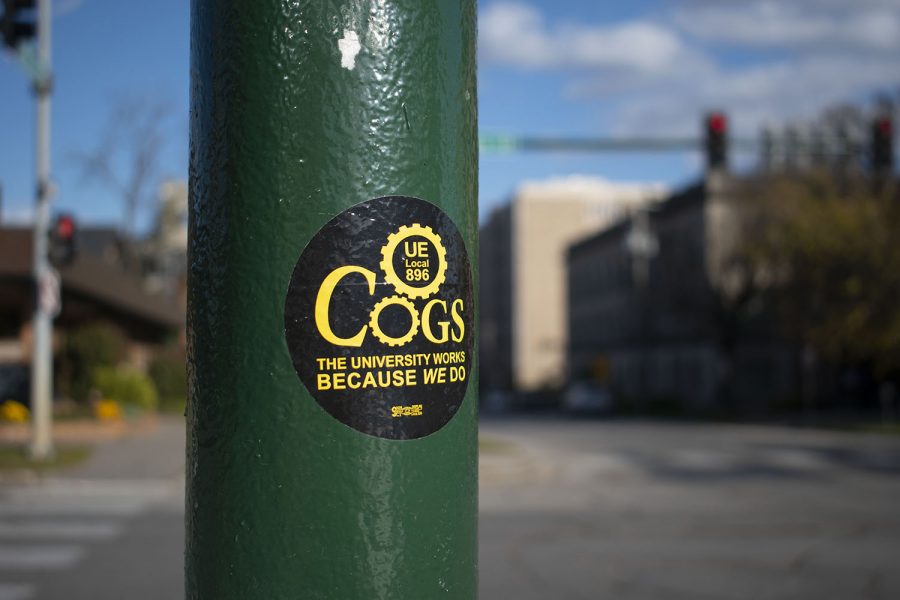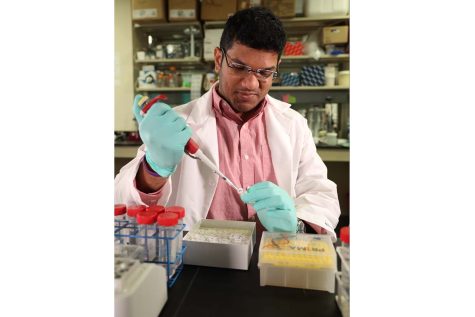Iowa OSHA issues no violations against UI, cites some workplace concerns in investigation
The Iowa branch of Occupational Safety and Health Administration cited several violations of recommended CDC safety guidelines in an unofficial document, but will not cite any violations against the University of Iowa.
A COGS sticker is seen on a stop light post on Friday, October 16, 2020.
March 20, 2022
The Iowa branch of the Occupational Safety and Health Administration will not issue any violations or citations against the University of Iowa following an investigation from complaints by the UI’s Campaign to Organize Graduate Students.
In a letter to UI Occupational Safety Manager Steve Paulsen, Iowa OSHA did not issue any citations, but noted that employees contracted COVID-19 through their work at the UI by being in close contact with others.
“It was determined that there were certain employees who contracted work-related COVID-19 by being in close contact…with others including other employees, students, and/or the public.”
The letter, written by Iowa OSHA Administrator Russell Perry, advised the university to encourage or require employees to engage in COVID-19 mitigation and protective measures. It also advised that the UI “evaluate any improvements that could be made to reduce and minimize” exposure to COVID-19.
The UI does not require vaccination or masks for students or employees, in line with the state Board of Regents’ policies. The UI and regents strongly recommend vaccination against COVID-19, and until the Centers for Disease Control and Prevention changed their metrics for mask requirements, the UI strongly encouraged that people on campus wear masks indoors.
In an email to The Daily Iowan, UI spokesperson Jeneane Beck wrote that the OSHA recommendations were in line with university policy.
“The University of Iowa places a very high priority on the health and well-being of its students, staff, and faculty and took significant and deliberate steps to reduce the risk of exposure to the COVID-19 virus,” she wrote. “It has abided by the Governor’s public health emergency declarations and the directives of its governing body, the Board of Regents, State of Iowa.”
Perry also recommended that the university record and track employee cases of COVID-19. The university does keep a tally of self-reported employee cases on its website.
“Throughout the pandemic, university leadership relied on guidance from the Centers for Disease Control and Prevention (CDC), as well as state and county health departments,” Beck said. “It has monitored a series of metrics, including new cases, available staffing for critical functions, and the capacity level at UI Health Care, to determine when or if to alter policies, procedures, or scheduling. “
An unofficial document provided by COGS to *The Daily Iowan,* however, cites that some COVID-19 measures at the UI were found by the agency’s investigator, Kengo Okuda, to be “highly unsatisfactory.”
Iowa OSHA reported these findings at a meeting with COGS on March 3 according to a COGS news release detailing its concerns from the same day.
The DI used several methods to contact Iowa OSHA, the investigations OSHA contact, and the Iowa OSHA bureau multiple times, but did not receive a response.
Beck said in an email to The DI on March 3 that the university was informed that day by Iowa OSHA that there were no violations found and no citations would be issued.
“The IOSHA inspector described the document provided as his informal method of organizing his notes and the information he received from both employees and the University,” Beck wrote. “It was not described as a final report.”
The news release from COGS states that Iowa OSHA investigators infer from their findings that graduate instructors “likely contracted COVID-19 in the working environment” because of the lack of preventative measures.
COGS filed an OSHA complaint on Sept. 21, 2021, asserting that the UI was violating its own safety measures as well as federal law.
Some of COGS’ dissatisfaction, according to the press release, is due to a “total lack of mask or vaccine requirements, surveillance testing, and a ban on informing students about positive cases in class.”
In addition, the press release quotes Okuda, who did not respond to requests for comment, describing some existing safety measures “as impractical and unfeasible” for workers.
Okuda is also cited in the release as saying that the UI was able to deny some instructors’ requests for online classes because the American Disabilities Act does not require accommodations for certain immunocompromised people.
COGS’ hopes moving forward
COGS Press and Publicity Chair Caleb Klipowicz said he hopes that, based on the findings, the UI will take graduate students’ health and safety more seriously.
Klipowicz said hazard pay is reasonable compensation for what he considers a lack of worker safety if the university continues requiring in-person instruction.
He added that it is difficult for COGS to press the university on COVID-19 safety measures, given federal and state steps to alleviate pandemic restrictions.
The UI changed its messaging around the use of face coverings in campus buildings on March 3 from “strongly encouraged” to “face masks are not required, but welcome.”
Johnson County is at a low community level of COVID-19, according to the Centers for Disease Control and Prevention’s COVID-19 County Check. The CDC does not recommend that healthy people in counties with low or medium levels of COVID-19 wear masks but says people may based on personal preference.
Upcoming OSHA reports
Klipowicz said COVID-19 safety is not COGS’ central concern right now as the omicron variant subsides in severity, but that they expect another COVID-19 wave and will be prepared to push the university again to avoid what they called an “insufficient, inadequate, and unacceptable” response.
The UI reported one new employee case of the virus on March 18 and a total of 3,558 campus-wide student and employee COVID-19 since Aug. 23, 2021.
Klipowicz says he hopes the UI will listen to the concerns of graduate students moving forward.
“And most importantly, they’ll start listening to campus voices like COGS, like professors, who have all been calling for the kinds of things that OSHA pointed out we have needed all along,” he said.




















